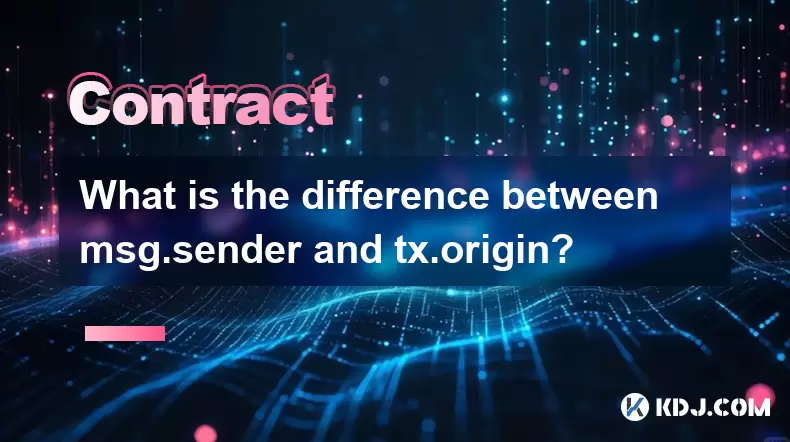-
 bitcoin
bitcoin $87959.907984 USD
1.34% -
 ethereum
ethereum $2920.497338 USD
3.04% -
 tether
tether $0.999775 USD
0.00% -
 xrp
xrp $2.237324 USD
8.12% -
 bnb
bnb $860.243768 USD
0.90% -
 solana
solana $138.089498 USD
5.43% -
 usd-coin
usd-coin $0.999807 USD
0.01% -
 tron
tron $0.272801 USD
-1.53% -
 dogecoin
dogecoin $0.150904 USD
2.96% -
 cardano
cardano $0.421635 USD
1.97% -
 hyperliquid
hyperliquid $32.152445 USD
2.23% -
 bitcoin-cash
bitcoin-cash $533.301069 USD
-1.94% -
 chainlink
chainlink $12.953417 USD
2.68% -
 unus-sed-leo
unus-sed-leo $9.535951 USD
0.73% -
 zcash
zcash $521.483386 USD
-2.87%
What is the difference between msg.sender and tx.origin?
In Ethereum smart contracts, `msg.sender` identifies the immediate caller, while `tx.origin` traces back to the original transaction initiator, each serving distinct security and logic purposes.
Jul 23, 2025 at 06:28 pm

Understanding the Basics of Ethereum Smart Contract Execution
In the Ethereum blockchain, smart contracts interact with users and other contracts through transactions and function calls. When developing or analyzing smart contracts using Solidity, it's essential to understand the difference between msg.sender and tx.origin. Both are global variables used to retrieve address information during contract execution, but they serve distinct purposes and behave differently in various contexts.
msg.sender refers to the immediate caller of the current function. This could be an externally owned account (EOA) or another contract. It is the most commonly used variable to determine who initiated the current interaction with the contract.
tx.origin, on the other hand, represents the original sender of the transaction, regardless of how many intermediate calls have occurred. It traces back to the EOA that initiated the transaction chain.
How msg.sender Works in Smart Contracts
When a function in a Solidity contract is called, the msg.sender variable is set to the address that directly invoked the function. This makes it a reliable source for identifying the immediate caller in access control or permission-based logic.
For example:
pragma solidity ^0.8.0;
contract Example {
address public owner;
constructor() {
owner = msg.sender;
}
function changeOwner(address newOwner) public {
require(msg.sender == owner, 'Only the owner can change ownership');
owner = newOwner;
}
}
In this contract, the msg.sender ensures that only the current owner can call the changeOwner function. If another contract calls this function on behalf of someone else, msg.sender will be that contract, not the original user.
How tx.origin Works in Smart Contracts
The tx.origin variable always points to the externally owned account (EOA) that initiated the entire transaction, even if multiple contract calls are made in between. It is useful when you need to know the original user behind a transaction, especially in complex contract interactions.
Here's an example to illustrate its behavior:
pragma solidity ^0.8.0;
contract A {
function callB(B _b) public {
_b.checkOrigin();
}
}
contract B {
function checkOrigin() public {
emit LogOrigin(msg.sender, tx.origin);
}
}
In this scenario, if an EOA calls callB from contract A, then:
- msg.sender inside
checkOrigin()will be the address of contract A. - tx.origin will be the EOA that started the transaction.
This distinction is crucial when designing logic that depends on knowing the original user rather than the intermediate contract.
Security Implications of Using tx.origin
Using tx.origin can introduce security risks in certain situations. One of the main concerns is phishing attacks, where a malicious contract tricks users into calling a function that performs sensitive actions based on the original sender.
For example:
function transferFromUser(address to, uint amount) public {
if (tx.origin == trustedUser) {
// Perform transfer
}
}
A malicious contract could trick trustedUser into initiating a transaction that calls this function, allowing the attacker to bypass checks that rely on tx.origin.
Therefore, it's generally recommended to use msg.sender for access control unless you have a specific reason to use tx.origin.
Practical Use Cases for msg.sender and tx.origin
While msg.sender is widely used in standard contract functions like ownership checks, access control, and token transfers, tx.origin has more niche applications.
Use msg.sender when:
- You need to know who called the current function.
- You are implementing access modifiers like
onlyOwner. - You want to prevent unauthorized contracts from interacting with your contract.
Use tx.origin when:
- You want to identify the original user initiating the transaction.
- You are implementing logic that should not be triggered by other contracts.
- You are building systems like referral programs or airdrops that require direct user interaction.
However, always be cautious with tx.origin due to its potential for misuse and vulnerability to phishing attacks.
Best Practices and Recommendations
When developing smart contracts, follow these best practices to avoid common pitfalls:
- Prefer msg.sender over tx.origin unless you have a compelling reason to do otherwise.
- Understand the call flow of your contracts and how msg.sender and tx.origin change during execution.
- Use tx.origin only in scenarios where you must ensure the original actor is an EOA.
- Audit your code for any use of tx.origin and assess whether it introduces unnecessary risk.
By understanding the nuances between msg.sender and tx.origin, developers can write more secure and predictable smart contracts.
Frequently Asked Questions
Q: Can msg.sender be a contract address?Yes, msg.sender can be either an externally owned account (EOA) or a contract address, depending on who called the function. If a contract invokes a function in another contract, the msg.sender will be the address of the calling contract.
Q: Is tx.origin always an EOA?Yes, tx.origin is always the externally owned account (EOA) that initiated the transaction. Even if multiple contracts are involved in the call chain, tx.origin remains the original user address.
Q: Can tx.origin be manipulated?While tx.origin cannot be forged directly, it can be exploited in phishing attacks. For example, a malicious contract may trick a user into triggering a transaction that performs an unintended action, relying on the tx.origin check for authorization.
Q: Should I avoid using tx.origin in my contracts?It's generally safer to avoid using tx.origin unless absolutely necessary. Since it can be used in ways that compromise security, many best practices recommend using msg.sender for access control and state-changing functions.
Disclaimer:info@kdj.com
The information provided is not trading advice. kdj.com does not assume any responsibility for any investments made based on the information provided in this article. Cryptocurrencies are highly volatile and it is highly recommended that you invest with caution after thorough research!
If you believe that the content used on this website infringes your copyright, please contact us immediately (info@kdj.com) and we will delete it promptly.
- Bitcoin Faces Liquidity Test Amid Shifting Institutional Support Landscape
- 2026-02-05 13:05:01
- Volkswagen Tayron R-Line 7-Seater: A New Era of Luxury Family SUV Hits India
- 2026-02-05 13:00:01
- AI, Crypto Bounties, and Human Labor: The Shifting Landscape of Work
- 2026-02-05 13:00:01
- Volkswagen Unleashes the Tayron R-Line: Pre-Bookings Now Live for Flagship Seven-Seater SUV
- 2026-02-05 12:55:01
- Bitcoin Drops Amidst Analyst Warnings and Shifting Market Sentiment
- 2026-02-05 09:40:02
- The Great Stablecoin Showdown: Systemic Risk, the GENIUS Act, and the Battle for Wall Street's Future
- 2026-02-05 12:55:01
Related knowledge

How to Manage Emotions and "Revenge Trading" in Futures?
Feb 05,2026 at 12:19am
Understanding Emotional Triggers in Futures Markets1. Market volatility directly impacts psychological states, often amplifying fear or euphoria based...

How to Analyze Market Sentiment Using the Fear and Greed Index?
Feb 05,2026 at 07:40am
Understanding the Fear and Greed Index1. The Fear and Greed Index is a composite metric designed to quantify prevailing emotional states among cryptoc...

How to Use Volume Profile to Find Key Futures Entry Levels?
Feb 04,2026 at 11:39pm
Understanding Volume Profile Structure1. Volume Profile displays the distribution of traded volume at specific price levels over a defined time period...

How to Trade Bitcoin Futures with 100x Leverage? (High-Risk Setup)
Feb 05,2026 at 11:00am
Understanding Bitcoin Futures Mechanics1. Bitcoin futures contracts represent agreements to buy or sell BTC at a predetermined price and date in the f...

How to Maximize Capital Efficiency Using Cross Margin Trading?
Feb 05,2026 at 12:40am
Cross Margin Trading Fundamentals1. Cross margin trading allows traders to use their entire account balance as collateral for open positions across mu...

How to Trade Crypto Contracts During Major News Events? (CPI/FOMC)
Feb 05,2026 at 09:59am
Understanding Market Sensitivity to Macro Data Releases1. Cryptocurrency futures markets exhibit pronounced volatility during U.S. CPI and FOMC announ...

How to Manage Emotions and "Revenge Trading" in Futures?
Feb 05,2026 at 12:19am
Understanding Emotional Triggers in Futures Markets1. Market volatility directly impacts psychological states, often amplifying fear or euphoria based...

How to Analyze Market Sentiment Using the Fear and Greed Index?
Feb 05,2026 at 07:40am
Understanding the Fear and Greed Index1. The Fear and Greed Index is a composite metric designed to quantify prevailing emotional states among cryptoc...

How to Use Volume Profile to Find Key Futures Entry Levels?
Feb 04,2026 at 11:39pm
Understanding Volume Profile Structure1. Volume Profile displays the distribution of traded volume at specific price levels over a defined time period...

How to Trade Bitcoin Futures with 100x Leverage? (High-Risk Setup)
Feb 05,2026 at 11:00am
Understanding Bitcoin Futures Mechanics1. Bitcoin futures contracts represent agreements to buy or sell BTC at a predetermined price and date in the f...

How to Maximize Capital Efficiency Using Cross Margin Trading?
Feb 05,2026 at 12:40am
Cross Margin Trading Fundamentals1. Cross margin trading allows traders to use their entire account balance as collateral for open positions across mu...

How to Trade Crypto Contracts During Major News Events? (CPI/FOMC)
Feb 05,2026 at 09:59am
Understanding Market Sensitivity to Macro Data Releases1. Cryptocurrency futures markets exhibit pronounced volatility during U.S. CPI and FOMC announ...
See all articles























![KING vs PAINIFY😳 (1v1 ZONEWARS) [FORTNITE TOKEN/WAGER] KING vs PAINIFY😳 (1v1 ZONEWARS) [FORTNITE TOKEN/WAGER]](/uploads/2026/02/05/cryptocurrencies-news/videos/origin_6984035326d58_image_500_375.webp)
![2/4 [U.S. Hot Search] CIA: Xi Jinping is a paranoid | Xi Jinping’s two phone calls | Shandong’s “Internet-addicted” teenagers rebelled against tyranny | A direct attack on the Chengdu hacker national team | Why GDP must grow by 5% | The bridge under construction by the China Railway 12th Bureau collapsed | Thousands of billions of dollars spent abroad and thirty billion domestic subsidies | 2/4 [U.S. Hot Search] CIA: Xi Jinping is a paranoid | Xi Jinping’s two phone calls | Shandong’s “Internet-addicted” teenagers rebelled against tyranny | A direct attack on the Chengdu hacker national team | Why GDP must grow by 5% | The bridge under construction by the China Railway 12th Bureau collapsed | Thousands of billions of dollars spent abroad and thirty billion domestic subsidies |](/uploads/2026/02/05/cryptocurrencies-news/videos/origin_69840a757417b_image_500_375.webp)

















































